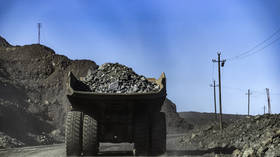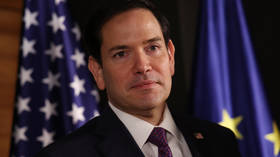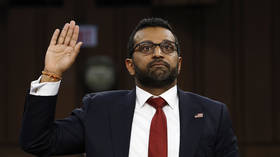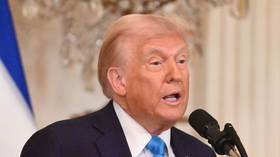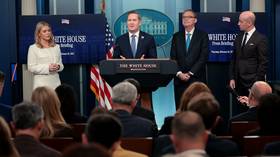US and Russia after the INF Treaty: What should Europeans fear?
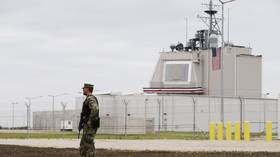
Despite termination of the Intermediate-Range Nuclear Forces (INF) Treaty soon, deployment of new missiles is unlikely but a disrupted security environment may give rise to provocative incidents “inviting” Russia to “partake.”
Given that there is a low probability that the US will change its stance of issuing ultimatums to Russia, the treaty will be terminated in August.
Although the INF didn’t reflect the current global order as it applied only to the US and the successor states of the Soviet Union, European nations perceived it as a security guarantee against dangerous military buildups on their soil. Hence, its ripples may affect Europe.
However, the development and deployment of ground-launched ballistic and cruise missiles with ranges of 500-5500km is ruled out in the short-term. And here are the reasons.
Also on rt.com Draft NATO-affiliated report reveals number & location of US nukes in EuropePotential reluctance of the energy dependent European countries
According to data from Eurostat, the EU’s statistical office, in 2018 Russia was the largest supplier of natural gas and petroleum oils to the EU with a 40.2% and 27.3% share respectively. Moreover, in 9 NATO member states (Bulgaria, Czech Republic, Estonia, Latvia, Hungary, Poland, Romania, Slovenia, and Slovakia) Russia’s share of total national imports of natural gas was reportedly more than 75%.
The NATO states, that have been “entrusted” to play a key role in “countering” Russia, such as Poland, Bulgaria, Romania, and the Baltic nations, are in varying degrees dependent from it.
According to Gazprom, 9,861bcm of natural gas was sold to Poland in 2018. The Polish state-controlled oil and natural gas company PGNiG may continue to import Russian gas until 2022 under the Yamal contract with Gazprom.
Although Bulgaria has planned to diversify its supply routes by importing LNG and Caspian gas, Russia has served as the sole exporter of natural gas to the country. Bulgaria has also played a key role in transit of Russian gas. Furthermore, as the President of Bulgaria Rumen Radev mentioned recently during the plenary session of the St. Petersburg International Economic Forum, Sofia would expect even more Russian gas to flow to Central Europe through Bulgaria.
Gazprom numbers indicate that Russian exports to Romania increased in 2018.
In addition to Russian gas supplies, the Baltic countries are also dependent on Russian electricity as their power grids are connected with the Soviet-era BRELL (Belarus, Russia, Estonia, Latvia and Lithuania) ring. This dependency will continue until 2025 when it is expected that full synchronization with Europe’s electricity grids will occur.
To sum up, the formation of a ‘sound’ anti-Russian coalition would not be as easy as it may be perceived from the rhetoric, and news about the US’ or NATO’ ramped-up military presence, increased military aid, and plans to establish or modernize military bases in the aforementioned countries.
Taking into account the energy dependence and economic interests, it would be at least irrational if those allies decide to host missiles or ensure an unnerving military posture.
Also on rt.com Trump considering sanctions against Nord Stream 2 gas pipeline to ‘protect Germany from Russia’Public disapproval
The unwillingness of the European leaders to provoke a new arms race would be effectively supported by public criticism.
Nowadays, people in Europe are more sensitive to threats, considering the rise of violence in the continent, and have more tools at their disposal to allow them to protest. Widespread protests would be quite challenging for European leaders given the existing issues over Brexit, migrants, and the deteriorating situation over Iran.
Fear of the reaction from Moscow
Any drastic shifts that could pose a threat to the national interests of Russia could cause an unexpected response from it.
In his 2019 address to the Federal Assembly, President Putin, mentioned the deployment of launchers which can accommodate Tomahawk cruise missiles in Romania and Poland, as an open violation of the treaty clauses. He warned that Russia would “respond with mirror or asymmetric actions.” He stated that Russia would have to target the decision-making centers of the missile systems.
US decision makers and policy planners are well informed about the nature of a possible Russian response which has been tested in the past in the case of Georgia and Ukraine.
Upcoming elections in the US
The Trump administration would refrain from radical foreign policy decisions ahead of the presidential elections in 2020.
Although US foreign policy is not believed to be as important in US elections as issues such as healthcare, immigration, and gun laws, any dramatic geopolitical event for the US would definitely affect voting behavior.
Also on rt.com US liberals self-destruct over migrant crisis, handing Trump 4 more years in powerWhile the US has been concerned about Russia’s alleged development of a ground-launched cruise missile since 2013, it is unclear what triggered Washington’s abrupt move. However, it is known from the U.S. Nuclear Posture Review 2018, that the US had already started “research and development by reviewing military concepts and options for conventional, ground-launched, intermediate-range missile systems,” as part of military measures to respond to Russia.
The explanation of the incentives of the withdrawal decision is further complicated in view of the above listed circumstances which would essentially limit the potential willingness of the US to deploy such missiles.
The move could be related to US concerns regarding China, which is not bound by the Cold War-era treaty. This is challenging for Russia too. But Russia could deploy those missiles in the East as a counterbalance against the potential US deployment to the Asia-Pacific.
Nevertheless, the US decision to walk away from the treaty will impact European security and worsen relations between the US and Russia.
Also on rt.com Nice try, wrong missile: US botches propaganda video accusing Russia of INF violationApparently, the vulnerable security situation and the lack of contacts within the NATO-Russia and US-Russia channels may give rise to incidents and provocations based on miscalculations or errors of information.
The risk of this happening has increased due to NATO’s and the US’ enhanced military presence.
As NATO Secretary General Jens Stoltenberg noted at a press conference ahead of a meeting of NATO foreign ministers in Washington in April, a 50% increase was seen in the number of days NATO ships spent in the Black Sea in 2018 compared with 2017.
It is worth mentioning the incident of a Russian Su-27 intercepting the US EP-3 Aries aircraft flying over the Black Sea. While Russia’s Defense Ministry said the crew “followed all necessary safety procedures,” the US Navy warned “unsafe actions increase the risk of miscalculation and potential for midair collisions”. Another such incident occurred last month over the Mediterranean Sea when a US P-8A Poseidon aircraft was intercepted by a Russian SU-35.
Also on rt.com US Navy posts VIDEO of Russian fighter jet’s ‘unsafe’ intercept of American spy plane over Black SeaProvoking Russia to become involved in such incidents could make European leaders recalculate their strategic choices and boost military cooperation with the US and within NATO. It would also stimulate further attempts to harm Russia’s strategic energy plans, such as the Nord Stream 2 project, in order to reduce Russian leverage against Europe and open the way for LNG imports for the sake of US business interests.
By Vahan Dilanyan
Vahan Dilanyan is a political analyst focused on the post-Soviet space. He holds a PhD in political science. He also served as an assistant to Armenia’s prime minister.
Think your friends would be interested? Share this story!
The statements, views and opinions expressed in this column are solely those of the author and do not necessarily represent those of RT.



